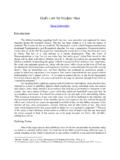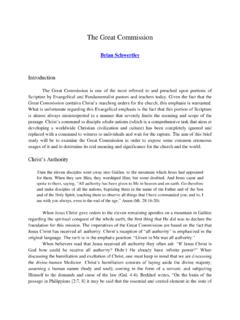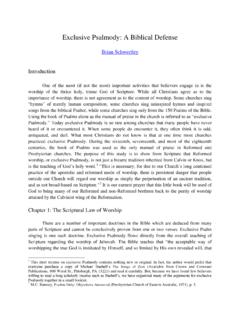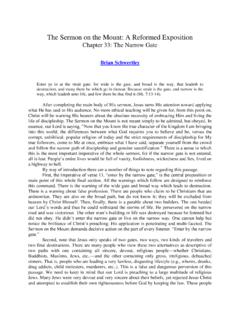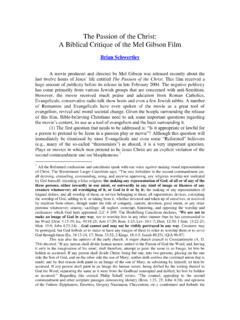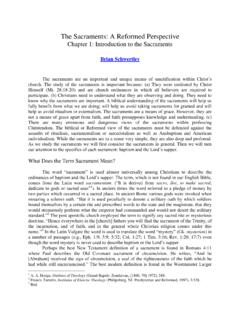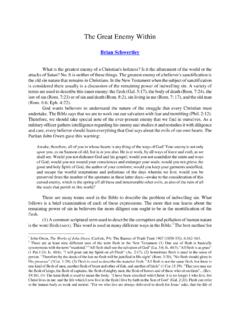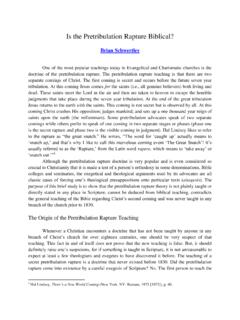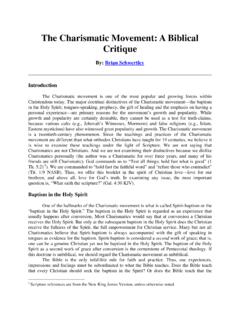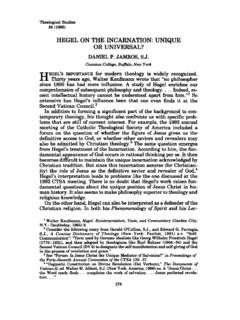Transcription of The Incarnation of Christ - Reformed Online
1 The Incarnation of Christ Brian Schwertley Introduction When we speak of Christianity or the gospel we must not only examine and understand what Jesus did, but also who He was and is. For, just as a trust or belief in the historical events in our Lord s life ( , the virgin birth, His sinless life, His sacrificial death, His resurrection and ascension to God s right hand) are necessary for salvation, so is a belief in the person of Christ . The Savior emphasized the central importance of His own person when He asked the disciples, Who do men say that I, the Son of man, am (Mt. 16:13)? This question continues to divide men throughout history. The different answers to Jesus question are what separate the saved from the lost, the sheep from the goats, the orthodox from the heterodox.
2 Given the importance of who Christ is for an understanding of the gospel and our own salvation we will turn our attention to the doctrine of the Incarnation . How does the Bible define the mediator, the redeemer of God s elect? How did the Savior come to dwell among sinful mortals? Why is the orthodox creedal definition of the hypostatic union of the two natures in one person so important for understanding the gospel? While the doctrine of Christ is one of the most difficult and perplexing teachings in all of Scripture, it also is the most rewarding. There is nothing better in life or death than to know, love and serve Jesus Christ . The Manner of the Incarnation : The Virgin Conception and Birth The virgin birth is an essential belief of the Christian faith that gives us some very important information regarding the mission and nature of the Christ .
3 The doctrine of the virgin birth is based on two explicit gospel accounts (Mt. 1:18-25 and Lk. 1:26-38); is found in the prophecy of Isaiah 7:14 and is presupposed in Paul s epistles (see Rom. 1:3; Gal. 4:4; Phil. 2:7). The birth narratives emphasize the following teachings. (1) The virgin birth is presented in Scripture as a great miracle or sign. The Lord Himself will give you a sign: Behold, the virgin shall conceive and bear a Son, and shall call His name Immanuel (Isa. 7:14). Although there are accounts in Scripture of births that are the result of supernatural intervention ( , of God miraculously enabling women who were infertile and/or past the age of child bearing to conceive and give birth to sons, , Sarah [Gen.)]
4 17:17-19, 21; 21:1-8]; Hannah [1 Sam. 1:5-11, 17-20]; the wife of Manoah [Judg. 13:2-24]; and, Elizabeth [Lk. 1:7, 13-25, 57]), the conception and birth of Jesus is totally unique. The conception of Christ did not even involve a human father. The salvation of sinners is to be supremely supernatural. Redemption can only be accomplished through the God-man. The supernatural virgin birth of Christ was an announcement to the Jews and the whole world that this child was like no other child. He was not simply a man of God or a prophet or a leader but God of very God. God Himself, the second person of the trinity had come to earth to redeem people throughout the whole world.
5 Modernist scholars reject the virgin birth of Christ and argue that the Hebrew word `almah simply designates an unmarried woman or a young maiden. The Christian liberal interpretation of the Incarnation must be rejected for the following reasons. (a) While an argument can be made that `almah does not necessarily refer to a virgin but simply an unmarried young woman, further revelation in the New Testament has settled the question once and for all. Mary was a virgin when the child was conceived and the baby was born. Modernist scholars are imposing their unbelieving naturalistic presuppositions upon the text of Scripture. The virgin birth is a fact of God s word that cannot be denied without also denying everything we need to know and trust to be saved.
6 Pagans and atheists make very poor interpreters of the Bible. (b) If Mary was not a virgin (as Modernists assert) then the conception and birth of Jesus could not have been a sign. In ancient as well as modern times there is nothing unusual about an unmarried woman becoming pregnant. It happens all the time. If a woman had committed fornication and became pregnant, the Jews nor anyone else would have regarded the event as significant at all. (c) If Mary had not become pregnant by the power of the Holy Spirit then Joseph, a godly man, would have put her away. Unfaithfulness on the part of a betrothed woman could be punished with death (see Dt. 22:23). Because the Jews were under Roman law on the matter of adultery, divorce was Joseph s only option.
7 Note, however, that God communicated the truth to Joseph that the child was conceived by the Holy Spirit (Mt. 1:20). Joseph responded to this revelation by taking Mary as his wife (Mt. 1:24). It is typical of Modernists who are the enemies of God to side with the Pharisees who accused the sinless Son of God of being a bastard (Jn. 8:41). Their judgment will be just. (2) Mary was enabled or caused to conceive the Christ by the power of the Holy Spirit. Luke writes, And the angel answered and said to her, The Holy Spirit will come upon you, and the power of the Highest will overshadow you; therefore, also, that Holy One who is to be born will be called the Son of God (1:35). The Holy Spirit comes upon Mary and works the conception by His almighty power.
8 Because the Messiah had to be divine it took a special divine action to accomplish the Incarnation . How this exactly occurred ( , the scientific details) we are not told. We can surmise, however, that the human nature of Jesus came directly from Mary while the second person of the trinity was united to the human nature at the very moment of conception. Theologians refer to this moment as the assumption. God the Son took upon Himself a true human body and a rational soul. When speaking of the action of the Holy Spirit in the conception of Jesus, Luke uses terminology that calls to mind the special Shekinah presence of God the power of the Highest will overshadow you (see Ex. 40:34-38).
9 (3) The narratives which speak of the virgin conception and birth of Jesus give the unborn child titles of essential divinity. He is called Son of the Highest [or Most High] (Lk. 1:32); the Holy One (Lk. 1:35); the Son of God (Lk. 1:35); who is to be called Emmanuel ( , God with us; Mt. 1:23). Although the expression Son of God is sometimes used in Scripture as a messianic title ( , Lk. 4:41; Ac. 9:20, 22), it often does not simply refer to a title of office but of nature (see Mt. 11:27; 14:28-33; 16:16; 21:33-46: 22:41-42; 26:63; Rom. 1:3; 8:3; Gal. 4:4; Heb. 1:1; etc.). The name Emmanuel which literally means with us is God is a doctrinally descriptive appellation. To be with Jesus is to be with God.
10 The expression holy One is often interpreted as a reference to our Lord s sinlessness or moral perfection. The phrase, however, may only mean in this context that Jesus is separated or set apart. From the moment of conception the Son of God was set apart for special service. The gospel narratives exclude all adoptionist conceptions of Christology for they teach that the human nature of our Lord never existed for a single moment without the divine. From the moment of conception Mary was the God bearer. (4) The manner of the Incarnation as well as the Incarnation itself teaches us that the second person of the trinity s coming into the world and assuming a human nature was a voluntary condescension; a submitting to humiliation on the part of the Son.
